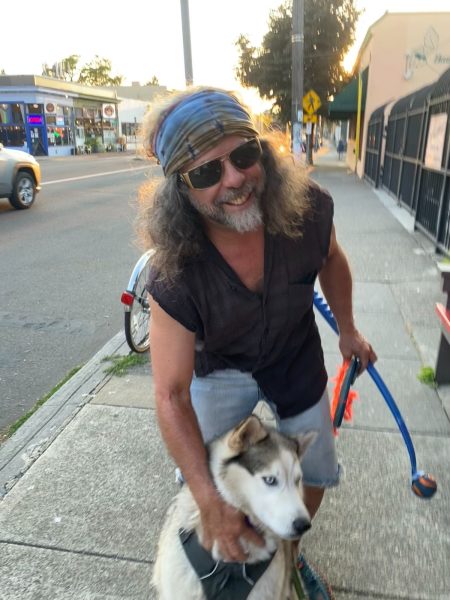It’s clear that third-party voters are a diverse group. The motives behind their ballots — or lack of ballots — vary, as do their voting histories, ages, and just about every aspect of their personalities. However, an electric undercurrent seems to run through them all: a live wire of disillusionment with America’s elections. While many view this election as the one to fray America’s fragile quilt of democracy, these voters beg the question: Is it time to pull out the foundational stitch of a two-party system?

Anthony “Tony” Crage, 58. Photo by Luke Susswood.
Politics was a contentious issue in Anthony “Tony” Crage’s East Coast childhood home. His mom, a “lefty,” was an avid feminist, casting her ballot primarily on social issues; his dad, an “intellectual conservative,” preached fiscal responsibility. Crage’s parents often fought about their differences, his mom acting as a peacemaker, his dad holding onto his strong beliefs. In 1984, Crage turned 18 and voted in his first election, the Democratic primary, for Jesse Jackson. After enrolling at the University of Buffalo as a political science major the following year, Crage became involved with political organizing on campus. However, in 1988, while on acid at a protest for the Iran Contra affair, his outlook on politics completely changed. “After that, I don’t think I ever voted,” he continues. “That’s when I got really into the hippy-dippy world of [the] Grateful Dead, which is very apolitical.” Crage truly embraced that lifestyle in the years following, explaining, “I did not vote, did not pay taxes, was not interested in politics, [and] didn’t care who the President was.”
Almost 40 years later, after the 2016 election, Crage’s political spark reignited, disgusted that someone like Donald Trump could hold the highest office in the United States. In 2020, Crage voted for his second time ever, this time for Joe Biden. However, that would likely be the last time Crage voted for a Democratic nominee. “Trump was the worst four years of leadership, [but] I think this is 100 times worse,” Crage continues. “I think the Democratic Party has lost its way, lost its soul.”
Crage’s distrust of the party only grew after Biden dropped out of the race in July, and Kamala Harris became the presumptive Democratic nominee. “I was an underground weed grower when Kamala Harris was a [District Attorney] in San Francisco,” he says, and explains that it’s interesting to see a significant part of his life being a contentious issue in this election.
Crage is now planning to support Robert F. Kennedy Jr., who is running under the We the People Party in Oregon, and will remain on Oregon ballots after pulling his name out in swing states to support former President Trump. This spring, Crage reengaged himself in local politics, collecting signatures outside of New Seasons on Hawthorne to help get Kennedy on the ballot.
However, after Kennedy’s endorsement of Trump, Crage is considering supporting Trump. He has his concerns, but Crage is clear in his desire to have a candidate who addresses issues that matter most to him, notably pharmaceutical and agricultural issues, both of which are a large part of Kennedy’s platform. He elaborates, saying, “I think [Trump’s] had a real awakening … not that he’s not a liar and a bullshitter, but there’s some things he’s not bullshitting or lying about.”
Just days after hearing that Kennedy had unofficially pulled out of the race, and weeks before the first debate between Harris and Trump where third-party candidates had not been invited, Crage expresses a common sentiment from independent voters: He’s disappointed to see third-party candidates silenced on the ballot and the media.
For Crage, this election cycle comes with feelings of hope and mistrust. He describes the cycle in just a few words, saying, “Corrupt, censored … hopeful … it’s kind of all those three words I think, you know, I want to stay a little positive.”
Anonymous Voter, 24
“I’m just not going to vote for a war criminal,” they begin. To them, this means that they’re not voting at all in this election. Frustration over Harris’ and Trump’s support for Israel has contributed to their decision to abstain, but ultimately they feel voting itself is an issue: “Presidential elections take the breath out of movements and actual engagement.” They point to organizing mutual aid and protesting as examples of actions that lose energy in the wake of presidential elections.
Protesting is something with which they have firsthand experience. In fact, they were recently arrested for protesting in support of Palestine. This experience confirmed for them how impactful community action can be. Whether it was resources while transitioning out of jail or legal advocacy from a local law student, they highlight their appreciation for the fact that “people are doing what they can from where they can.”
Although they radicalized in recent years, they’ve been politically engaged for much longer, and have been protesting since teenhood. Growing up with a liberal mother meant they were politically active, but primarily in electoral politics. They recall, “When I was 16 and couldn’t vote in the [2016] election, I remember blaming people who didn’t vote. I’ve come to realize that being politically active is a lot more than showing up every four years.” In the 2020 election, they voted for Biden from Wisconsin.
Now they feel disillusioned by both parties, stating, “Trump’s evil for sure, but they both are.” It’s “the specific war crimes this Democratic administration is committing [in Palestine] at this moment, rather than a vague sense of evil,” that motivated them to abstain from voting. However, they are concerned about the electoral system in general. They elaborate, “When there’s an election cycle there’s so much attachment to ‘our side.’” This attachment creates a rhetoric of “good” versus “bad” that makes it difficult to discuss other issues for fear of distracting from the election, which they say makes elections “really superficial.” As political polarization reaches new heights, this rhetoric only grows more powerful, and they explain that “at some point, you have that realization of ‘Are we supposed to vote for the lesser evil forever?’” They’ve made a resolute choice not to.
In their opinion, there is no difference between Republicans and Democrats. They emphasize, “A lot of people talk about Project 2025 but what they don’t realize is that fascism is on the rise under a Democratic president too.” The biggest change they’ve seen comes from local action, so they “challenge people to take a step back and engage beyond just [voting].”

Logan Markwell, 19. Photo via Logan Markwell.
Logan Markwell, a freshman at Wheaton College in Massachusetts and a Franklin High School alum, is the only one of these three voters with a straightforward candidate to support: Jill Stein. Yet he avoids idolizing her, acknowledging, “You can’t expect someone to be infallible, but I think [Stein] is a lot better than the other options.”
Markwell grew up in the heart of the deep blue: Portland. His parents were classic Portland liberals whose social values were reflected on their ballots. Then, in 2016, everything changed. Markwell’s father became interested in the Green Party and Markwell soon followed. He explains, “If I had not had that exposure in the home I don’t know if I would be supporting Jill Stein.”
Markwell’s support for Stein began last year when she announced her candidacy, but his journey of political engagement has been gradual. “As I got older, I became more aware of what was going on around me, and wanted to learn more about the systems in place that can uphold and change our country,” he says.
Markwell is registered to vote in Oregon and says they know that their ballot won’t change the election; they explain that this is part of their motivation to vote third-party. “If I’m not voting to change the election in terms of who wins, I have to be voting another way. So I’m voting for my morals and what I believe can, in the long run, achieve the most change,” says Markwell. They expand, saying that if they were in a purple district in a swing state, they would “be considering Kamala Harris, because I do recognize that if Kamala Harris were to get elected, well, she would not make any meaningful change. [However, s]he would keep us from progressing further back and losing important [battles on] social issues.” Nevertheless, Markwell is also quick to critique the party as a whole, saying, “I think that the Democratic Party is incredibly hypocritical in the fact that they [say] that they’re defending democracy and saving us from a loss of democracy … while actively engaging in anti-democratic exercises to gain a monopoly of the system.”
Some of the topics that are most important to him this cycle are the economy, the Israel-Gaza conflict, and climate change. For Markwell, Stein addresses his values through her support of a fracking ban, calls for a ceasefire, and plans for student loan forgiveness.
His frustrations with America’s electoral system have never been more apparent than in this election. Markwell is in support of diversifying the federal government, explaining that “if the Green Party is able to obtain a certain percentage of the popular vote … they are able to secure federal funding for elections … [meaning] they might be able to gain more power in [the] federal government.” In the long run, Markwell would like to see the U.S. move to a parliamentary system as well as replace the Electoral College with ranked-choice voting.
Markwell sees problems in censorship and representation in this cycle but ultimately holds hope for the future of democracy. They continue to emphasize the need for the dismantlement of the two-party system, but ultimately know that, “Change isn’t going to happen in a single election cycle,” a sentiment all three of these voters — and voters nationwide — agree with.





































Sean • Oct 12, 2024 at 10:04 pm
The only way we can break the stranglehold of the two-party system is to change the WAY we vote. Our current voting method of picking one candidate (aka First Past the Post) will ALWAYS resolve to two parties. We need Ranked Choice Voting or STAR Voting if we want to give other parties any chance of success.